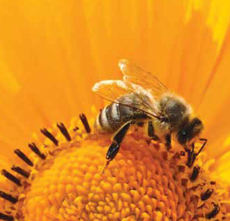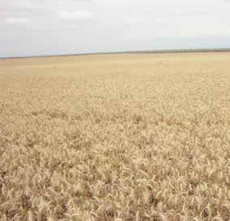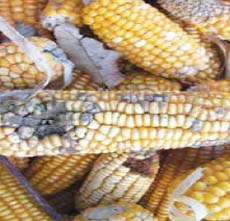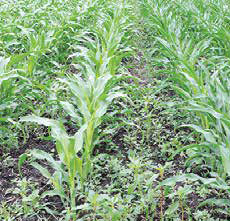Protecting Bees from Pesticides
By David Jones & Anne-Marie Steyn
 Yields in high value cash & export crops such as coffee, potatoes, avocados, pawpaws, watermelons, oranges, cucumber, passion fruit, etc, hugely depend on the pollination activities carried out by bees, butterflies, birds & other pollinators. Pollinators are essential to the production of many of the micronutrient rich fruits, vegetables, nuts, seeds and oils we eat. In fact, close to 75 percent of the world’s crops producing fruits and seeds for human consumption depend, at least in part, on pollinators for sustained production, yield and quality. The diversity of food available is largely owed to bees and other pollinators. But alarmingly, in a number of regions, pollination services are showing declining trends.
Yields in high value cash & export crops such as coffee, potatoes, avocados, pawpaws, watermelons, oranges, cucumber, passion fruit, etc, hugely depend on the pollination activities carried out by bees, butterflies, birds & other pollinators. Pollinators are essential to the production of many of the micronutrient rich fruits, vegetables, nuts, seeds and oils we eat. In fact, close to 75 percent of the world’s crops producing fruits and seeds for human consumption depend, at least in part, on pollinators for sustained production, yield and quality. The diversity of food available is largely owed to bees and other pollinators. But alarmingly, in a number of regions, pollination services are showing declining trends.
Read more ...
Post-Harvest Wheat Management in the Face of Climate Change
Post-harvest wheat management includes activities such as harvesting, drying, storage, and transportation, all of which can be influenced by climate change in various ways.
 Climate change is one of the most pressing challenges of our time, and its impacts are being felt across the globe. As a climatesensitive sector, agriculture is particularly vulnerable to the changing climate. Wheat, one of the world’s most important staple crops, faces significant challenges in the post-harvest phase as a result of climate change.
Climate change is one of the most pressing challenges of our time, and its impacts are being felt across the globe. As a climatesensitive sector, agriculture is particularly vulnerable to the changing climate. Wheat, one of the world’s most important staple crops, faces significant challenges in the post-harvest phase as a result of climate change.
The Impact of Climate Change on Wheat Production
Wheat is a vital source of food for billions of people worldwide. It is grown in a wide range of climatic conditions, making it susceptible to the effects of climate change.
Read more ...
 As the World Food Day was marked on October 16, 2023, millions worldwide were starving and global food wastage is yet to ease.
As the World Food Day was marked on October 16, 2023, millions worldwide were starving and global food wastage is yet to ease.
 Weeds are a significant challenge in agriculture, landscaping, and natural resource management. They compete with crops for nutrients, water, and sunlight, reducing yields and overall productivity. To combat these unwanted plants, herbicides are a common and effective tool. However, selecting the right herbicide for a particular situation is crucial for successful weed control. Various factors come into play when choosing the most suitable herbicide, and understanding these factors is essential for effective and responsible herbicide use.
Weeds are a significant challenge in agriculture, landscaping, and natural resource management. They compete with crops for nutrients, water, and sunlight, reducing yields and overall productivity. To combat these unwanted plants, herbicides are a common and effective tool. However, selecting the right herbicide for a particular situation is crucial for successful weed control. Various factors come into play when choosing the most suitable herbicide, and understanding these factors is essential for effective and responsible herbicide use. Yields in high value cash & export crops such as coffee, potatoes, avocados, pawpaws, watermelons, oranges, cucumber, passion fruit, etc, hugely depend on the pollination activities carried out by bees, butterflies, birds & other pollinators. Pollinators are essential to the production of many of the micronutrient rich fruits, vegetables, nuts, seeds and oils we eat. In fact, close to 75 percent of the world’s crops producing fruits and seeds for human consumption depend, at least in part, on pollinators for sustained production, yield and quality. The diversity of food available is largely owed to bees and other pollinators. But alarmingly, in a number of regions, pollination services are showing declining trends.
Yields in high value cash & export crops such as coffee, potatoes, avocados, pawpaws, watermelons, oranges, cucumber, passion fruit, etc, hugely depend on the pollination activities carried out by bees, butterflies, birds & other pollinators. Pollinators are essential to the production of many of the micronutrient rich fruits, vegetables, nuts, seeds and oils we eat. In fact, close to 75 percent of the world’s crops producing fruits and seeds for human consumption depend, at least in part, on pollinators for sustained production, yield and quality. The diversity of food available is largely owed to bees and other pollinators. But alarmingly, in a number of regions, pollination services are showing declining trends. Climate change is one of the most pressing challenges of our time, and its impacts are being felt across the globe. As a climatesensitive sector, agriculture is particularly vulnerable to the changing climate. Wheat, one of the world’s most important staple crops, faces significant challenges in the post-harvest phase as a result of climate change.
Climate change is one of the most pressing challenges of our time, and its impacts are being felt across the globe. As a climatesensitive sector, agriculture is particularly vulnerable to the changing climate. Wheat, one of the world’s most important staple crops, faces significant challenges in the post-harvest phase as a result of climate change.